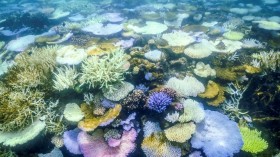Once considered simple and hardly the life of the party, pond algae now appears to be quite complex, containing the potential to produce new forms of carbohydrates and natural products.
Dr. Ellis O'Neill and Professor Rob Field of the John Innes Center (U.K.) projected that pond algae, or Euglena gracilis, has at least 32,000 active, protein-encoding genes, which is significantly more than humans--who have approximately 21,000. Of those 32,000, roughly 60 percent of the active genes found in the researchers' transciptome contain untapped potential, having never before been identified. The researchers' findings were recently published in the journal Molecular Biosystems.
Euglena is a single cell alga that inhabits most garden ponds. It is a highly complex alga in the green plant line that shows characteristics of both plants and animals. In evolutionary terms, it is most closely related to the protozoan parasites Trypanosoma and Leishmania. Previously, this organism was known as simply a rich source of vitamins A, C and E, as well as amino acids that are essential for the human diet. However, that list of attributes has become more complex with Professor Field and his team's analysis of the Euglena RNA molecules, according to a release.
"We know there are many products made from Euglena which are already on the market -- beauty and nutritional supplements, foods and even fuel for cars -- all popular in Japan and the Far East," geneticist Rob Field said in the statement. "What we didn't realize is that there is so much more that Euglena is capable of producing which could give us new treatments, cures and industrial capabilities. We hope this landmark research will encourage other scientists to build on our findings with Euglena, and other algae, to work out exactly what compounds they make and how we can use them."
From their research, O'Neill and Field discovered that Euglena has the genetic information to make many different natural compounds. However, they have not yet determined what they are or what they can do, suggesting that there is much more to learn about the biology of Euglena, the release noted.
Their study also revealed that different sets of genes become active when Euglena is grown in the dark, compared to when it is grown in the light, indicating that it can dramatically shift its metabolism depending on its environment. This means that Euglena has the ability to live successfully in varying environments, said the release.
Euglena creates many well-known, valuable natural products including vitamins, essential amino acids and a sugar polymer which is reported to have anti-HIV effects. Further research holds the potential for discovery of new applications, such as medicines, including antibiotics; nutrients; and new biofuels, the release further noted.
While many think that the genetic information of algae is simple, this study has revealed that it is in fact much more complex. This complicates the definition of what these single-celled organisms are capable of and encourages researches to focus on simpler microorganisms, such as bacteria, fungi, or viruses in the future.
According to the release, the JIC team identified candidate genes in the Euglena transcriptome for all the pathways and metabolic processes that one would expect in a motile, photosynthetic organism. With this, they also discovered an unexpected capacity for producing and modifying carbohydrate polymers and the generation of as-yet unknown natural products.
Professor Field and his team now look to the scientific community to help classify these new products and determine how they may be used.
For more great nature science stories and general news, please visit our sister site, Headlines and Global News (HNGN).
© 2024 NatureWorldNews.com All rights reserved. Do not reproduce without permission.

![Microplastics Escape Body's Gut to 'Infiltrate' the Brain, Kidneys and Liver [Study]](https://1471793142.rsc.cdn77.org/data/thumbs/full/70195/280/157/50/40/microplastics-escape-bodys-gut-to-infiltrate-the-brain-kidneys-and-liver-study.jpg)



